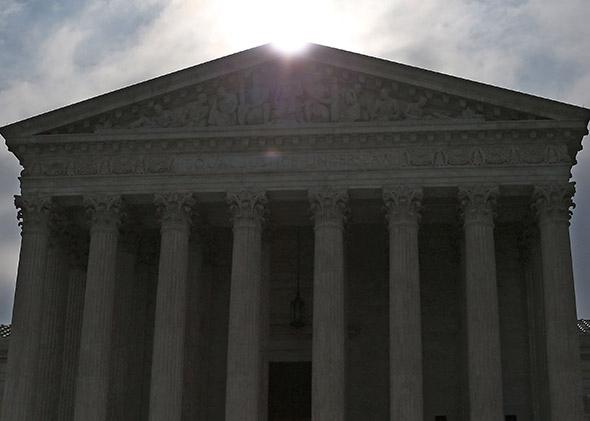Kenji, Dahlia,
I’m glad to hear the scene on the court plaza following this morning’s announcement of the marriage equality decision was dignified. The gracious conduct of same-sex marriage supporters outside the courtroom throws into even starker relief the cold, petty, embarrassing dissents by each conservative justice.
Start with Chief Justice John Roberts, who wrote such a marvelously measured and opaque dissent in United States v. Windsor. This time around, Roberts let his worst, most small-minded tendencies get the better of him. Roberts’ admonition to gay people and their allies—“[D]o not celebrate the Constitution. It had nothing to do with it.”—is one of most spiteful lines he’s ever written. Roberts also likens the ruling to Lochner v. New York, arguing that the court has overstepped its constitutional bounds and acted as a “super-legislature.” But it’s hard to take these complaints seriously coming from the man who engineered Citizens United and helped to invent an individual right to own guns.
Justice Antonin Scalia’s dissent is equally hypocritical, especially in light of his King v. Burwell dissent just yesterday. Scalia calls the decision a “judge-empowering” “Putsch” based on “hubris,” a “naked judicial claim to legislative—indeed, super-legislative power.” These complaints, arriving exactly one day after Scalia hoped to cripple a major act of Congress through a strained, implausible reading of one phrase in a sub-sub-subsection, rings quite hollow.
I’m actually quite surprised Justice Clarence Thomas chose to write a separate dissent. He joined others’ dissents in Romer v. Evans and United States v. Windsor, refraining from writing his own, and penned a brief, apologetic dissent in Lawrence v. Texas, calling the sodomy ban “uncommonly silly.” Given this track record, I had assumed that Thomas isn’t particularly exercised one way or the other about gay rights.
I was wrong. Thomas’ dissent is, in many ways, the fieriest of the bunch. To his mind, the “liberty” guaranteed by the Due Process Clause is not a liberty to receive something from the government (like marriage benefits) but rather to be free from government restraint. Thomas also disputes the notion that, by depriving gay couples of marriage rights, states can deprive them of “dignity.” “Human dignity,” Thomas writes, “cannot be taken away by the government”:
Slaves did not lose their dignity (any more than they lost their humanity) because the government allowed them to be enslaved. Those held in internment camps did not lose their dignity because the government confined them. And those denied governmental benefits certainly do not lose their dignity because the government denies them those benefits. The government cannot bestow dignity, and it cannot take it away.
Thomas also accuses the majority of “demean[ing]” opponents of marriage equality—an astonishing charge, since Thomas refuses to believe that anti-gay laws demean gay people. His opinion all but declares that, personally and politically, he vehemently opposes same-sex marriage. He even trots out the right-wing talking point that the ruling “threatens the religious liberty our Nation has long sought to protect.” That undercurrent of animus makes the rest of his logic sound like so much pretext.
Oddly, Justice Samuel Alito’s dissent is the most measured and respectful. But it is also the goofiest. Alito comes close to saying that same-sex marriage isn’t true marriage, since, “[f]or millennia, marriage was inextricably linked to the one thing that only an opposite-sex couple can do: procreate.” Here, Alito buys into the coitus theory of marriage—the strange notion that a marriage is only valid if it involves heterosexual intercourse. Apparently Alito doesn’t buy the idea that marriages are about love and mutual support. Real marriages are about coitus, not commitment.
Alito also channels his inner right-wing ideologue when fretting about the vilification of gay marriage opponents. “I assume,” he writes, “that those who cling to old beliefs will be able to whisper their thoughts in the recesses of their homes, but if they repeat those views in public, they will risk being labeled as bigots and treated as such by governments, employers, and schools.”
But Alito fails to explain why the court’s decision today will exacerbate the “risk” that gay marriage opponents will be “labeled as bigots.” Clearly, even before today’s decision, America was shifting rapidly toward tolerance. What Alito is really terrified of, I think, is the impending, inevitable widespread agreement that people who share his beliefs about marriage are bigoted. The court’s pro-gay ruling has little bearing on that eventuality, except perhaps to hasten it a tiny bit. Alito isn’t afraid of today’s decision. He’s afraid of the future.
Read the previous entry, by Kenji Yoshino. Read the next entry, by Dahlia Lithwick.
Read more of Slate’s coverage of same-sex marriage at the Supreme Court.
